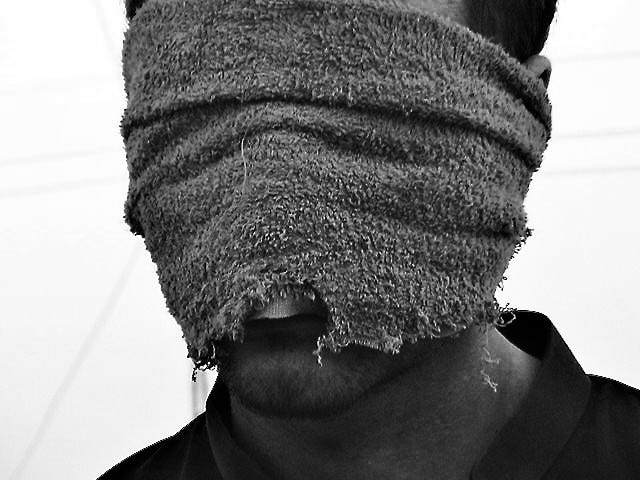We are all just prisoners . . .
THE CUTLINE (a story in photos.)
Anemones
It is nearly 2am and there are six men, bound and blindfolded on their knees forming a crescent around an armor-plated Humvee.
It is their hands that fascinate me the most—perhaps because I can still see them, white finger anemones wriggling in the darkness.
Their faces have already disappeared behind dirty strips of cloth or snuffed like candles with nylon sandbags. It takes only moments from the time they are captured and faced down in the dirt, to the click, click, click of the plastic cuffs noosed around their wrists.
It is with stunning swiftness that these Iraqi men, these suspects in a guerrilla war against occupation forces, are ‘bagged and tagged” in a world where the American military, as it so often proclaims, owns the night.
One prisoner, who looks to be no more than 19 or 20 years old, the same age as many of the American soldiers that now surround him, is getting more attention than the others.
In the dark chill he is dressed in nothing more than a thin, cotton gray dish dash robe. As two OH-58’s whirl above a soldier bends down beside the prisoner and talks to him as if he were a misbehaving infant.
Go Boom.
“You hear those choppers,” he says, “you like helicopters don’t you? You like to shoot down helicopters? Go boom?”
The brigade commander later tells me the prisoner has been identified by four separate local sources as one of the men directly involved in the recent shoot down of a Blackhawk helicopter that killed six soldiers; perhaps even the trigger man who launched what the Army believes was a Bulgarian-made Strela-3 missile.
I look at his index finger. It is un-calloused, slender, did it, I question in my mind, make the deadly pull?
The captured men are are taken in front of the Humvee where an informant sits behind bulletproof glass. They are already blindfolded but a soldier shines a flashlight in their faces anyway to make sure they cannot identify their accuser.
If the informant nods the man is taken to the right, if he shakes his head, they are taken to the left and . . . released?
Pity or Recognition?
It is strange to me that it is not so much pity that I feel while I am videotaping them, painting them green with my infrared light on my camera, but recognition.
I know the position they are in, the dread you feel to be bound and awash in the indecipherable language of your captors, to feel your mouth turn as dry as the desert that surrounds you, to wonder if this will be the hour of your death—or to wonder if the hours to come will make you wish it had been, to know that at this moment you are helpless and hopeless and that the question of whether you have any control over your own destiny has finally and irrefutably been answered.
Early in the war my CNN team and I had been in the very same position. But we were captives of the men American forces now hunt down—Saddam’s Fedayeen militia.
We had pushed too hard to be the first journalists into Tikrit, the last major city not fallen to coalition forces.
Thirty kilometers from our prize, at a checkpoint near a village called Amal Bedi, we are forced from our vehicles at gunpoint and told to lie face down on the road.
Their leader, a middle-aged man wearing a red head-scarf called a kaffiyeh and a dirty trench coat, looks at me with contempt and says in Arabic, “This one is surely an American spy.”
Then he lowers the barrel of his AK-47 and fires a shot on the asphalt between my legs. I am frozen in place. My colleagues are kicked and punched while my arms are bound tightly behind my back.
My translator, a Kurd from Sulamaniyah named Tofiq looks at me and says,
“Today is the day that surely we will die.”
But it is Tofiq who will save us—goading a tribal chieftain to intervene with the Fedayeen, bluffing that if we are harmed coalition forces will turn their village, Almal Bedi, into rubble.
We are eventually released, but have lost one of our trucks, most of our gear and all of our money; thousands in U.S. dollars that were supposed to help buy us out of binds like this one. What we have though is more than the sum of all of that. Our lives.
And it was not violence or bullets, but words — Tofiq’s words that have set us free.
Now as I look at these men, bound and blindfolded, I think of my time in their place; that they have no Tofiq to speak on their behalf, wonder if they are guilty or innocent of what they are accused.
If these men had instead been my Fedayeen captors would it be me leaning over and whispering discomforting things to them?
If these had been my Fedayeen captors could I have done worse?
If these had been my Fedayeen captors might I have done better?
[Six months after this event, in April 2004, the systematic abuse of Iraqi prisoners by U.S. soldiers at Abu Graib Prison was first reported with accompanying graphic photographs and videos.]
Kevin Sites reported the war in Iraq from 2003 – 2015, beginning with the U.S.-led invasion and ending with the rise of the Islamic State.
His award-winning book, The Things They Cannot Say, details more stories like this one. You can find it at the link below.
https://amzn.to/4cfGyb0














